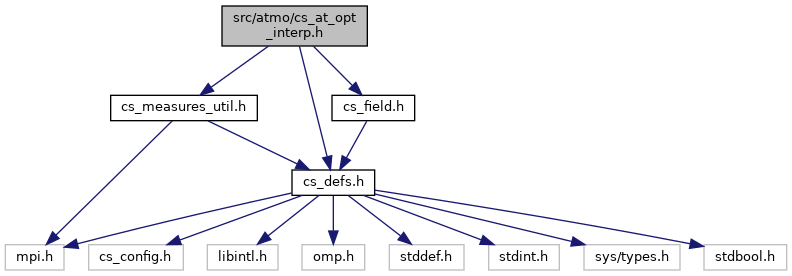Go to the source code of this file.
|
| cs_at_opt_interp_t * | cs_at_opt_interp_create (const char *name) |
| | Create an optimal interpolation descriptor. More...
|
| |
| cs_at_opt_interp_t * | cs_at_opt_interp_by_id (int id) |
| | Return a pointer to an optimal interpolation based on its id. More...
|
| |
| cs_at_opt_interp_t * | cs_at_opt_interp_by_name (const char *name) |
| | Return a pointer to an optimal interpolation based on its name. More...
|
| |
| void | cs_at_opt_interps_destroy (void) |
| | Destroy all defined optimal interpolations. More...
|
| |
| void | cs_at_opt_interp_read_file (char const filename[50], cs_measures_set_t *ms, cs_at_opt_interp_t *oi, const int f_dim) |
| | Read an optimal interpolation file for a given variable and fill in the matching measures set and optimal interpolation structures. More...
|
| |
| int | cs_at_opt_interp_is_p1_proj_needed (void) |
| | Return 1 if a p1 projection has been enabled for at least one optimal interpolation. This function is used to determine if extended neighborhood is needed. More...
|
| |
| void | cs_at_opt_interp_map_values (cs_at_opt_interp_t *oi, cs_measures_set_t *ms) |
| | (re)Allocate and fill in an optimal interpolation structure from an optimal interpolation file. More...
|
| |
| void | cs_at_opt_interp_obs_operator (cs_measures_set_t *ms, cs_at_opt_interp_t *oi, cs_interpol_grid_t *ig) |
| | Compute observation operator (H). More...
|
| |
| void | cs_at_opt_interp_project_model_covariance (cs_measures_set_t *ms, cs_at_opt_interp_t *oi) |
| | Compute $\tens{H}\tens{B}\transpose{\tens{H}}$. More...
|
| |
| int * | cs_at_opt_interp_get_active_obs (cs_measures_set_t *ms, cs_at_opt_interp_t *oi, cs_field_t *f_oia, bool **inverse, int ***ao_idx) |
| | Count active observations and compute time weights in case of unsteady. More...
|
| |
| void | cs_at_opt_interp_compute_analysis (cs_field_t *f, cs_at_opt_interp_t *oi, cs_field_t *f_oia, int n_active_obs, int *ao_idx, bool inverse, int mc_id) |
| | Compute analysis for a given variable. More...
|
| |
◆ cs_at_opt_interp_type_t
| Enumerator |
|---|
| CS_AT_OPT_INTERP_P0 | |
| CS_AT_OPT_INTERP_P1 | |
◆ cs_at_opt_interp_by_id()
Return a pointer to an optimal interpolation based on its id.
This function requires that an optimal interpolation of the given id is defined.
- Parameters
-
| [in] | id | optimal interpolation id |
- Returns
- pointer to the optimal interpolation structure.
◆ cs_at_opt_interp_by_name()
Return a pointer to an optimal interpolation based on its name.
This function requires that an optimal interpolation of the given name is defined.
- Parameters
-
| [in] | name | optimal interpolation name |
- Returns
- pointer to the optimal interpolation structure.
◆ cs_at_opt_interp_compute_analysis()
Compute analysis for a given variable.
- Parameters
-
| [in] | f | field variable of which analysis will be computed |
| [in] | oi | optimal interpolation for field variable |
| [in] | f_oia | analysis field of field variable |
| [in] | n_active_obs | number of active observations. |
| [in] | ao_idx | index of active observations |
| [in] | inverse | boolean, true if it necessary to recompute the inverse of HB(H) |
◆ cs_at_opt_interp_create()
Create an optimal interpolation descriptor.
- Parameters
-
| [in] | name | optimal interpolation name |
◆ cs_at_opt_interp_get_active_obs()
Count active observations and compute time weights in case of unsteady.
- Parameters
-
| [in] | ms | pointer to measures set |
| [in] | oi | optimal interpolation for field variable |
| [in] | f_oia | analysis field of field variable |
| [in] | inverse | boolean, true if it necessary to recompute the inverse of HB(H) |
| [in] | ao_idx | index of active observations |
- Returns
- number of active observations.
- Parameters
-
| [in] | ms | pointer to measures set |
| [in] | oi | optimal interpolation for field variable |
| [in] | f_oia | analysis field of field variable |
| [in] | inverse | boolean, true if it necessary to recompute the inverse of HB(H) |
| [in] | ao_idx | index of active observations |
- Returns
- number of active observations for each measures component.
◆ cs_at_opt_interp_is_p1_proj_needed()
| int cs_at_opt_interp_is_p1_proj_needed |
( |
void |
| ) |
|
Return 1 if a p1 projection has been enabled for at least one optimal interpolation. This function is used to determine if extended neighborhood is needed.
- Returns
- 1 if a p1 proj. is needed, 0 otherwise.
◆ cs_at_opt_interp_map_values()
(re)Allocate and fill in an optimal interpolation structure from an optimal interpolation file.
- Parameters
-
| [in] | oi | pointer to the optimal interpolation |
| [in] | ms | pointer to the associated measures set |
◆ cs_at_opt_interp_obs_operator()
Compute observation operator (H).
- Parameters
-
| [in] | ms | pointer to measures set |
| [in] | oi | pointer to an optimal interpolation |
| [in] | ig | pointer to interpol grid |
◆ cs_at_opt_interp_project_model_covariance()
Compute $\tens{H}\tens{B}\transpose{\tens{H}}$.
- Parameters
-
| [in] | ms | pointer to measures set |
| [in] | oi | pointer to an optimal interpolation |
◆ cs_at_opt_interp_read_file()
Read an optimal interpolation file for a given variable and fill in the matching measures set and optimal interpolation structures.
- Parameters
-
| [in] | filename | name of interpolation file |
| [in] | ms | measures set structure |
| [in] | oi | optimal interpolation structure |
| [in] | f_dim | dimension of field |
◆ cs_at_opt_interps_destroy()
| void cs_at_opt_interps_destroy |
( |
void |
| ) |
|
Destroy all defined optimal interpolations.

 1.8.16
1.8.16